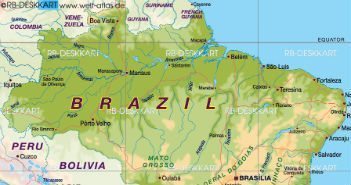The Colombian regulator needs more power to increase competition in the telecommunications sector, according to a new report from the OECD (Organization for Economic Co-operation and Development). The report does recognize that Colombia has done a lot to strengthen the rules governing its telecom sector, but the country still has a highly concentrated mobile market—the dominant mobile operator controls around 60% of the market, compared with an average of 42% in other OECD countries. The OECD found that the country’s Communications Regulation Commission (CRC) lacks independence and sanctioning powers.
Among its recommendations, the OECD said the CRC should be more independent and responsible for enforcing regulations. It should be given the power to impose sanctions for non-compliance and have the authority to conduct spectrum auctions, or establish auction criteria, given the auctions’ implications for competition. The report suggests that the merger of the CRC and the national television authority, ANTV, would ease the shift to greater convergence.
To increase competition, the OECD recommended that the CRC should prevent off-net/on-net price discrimination and reduce termination rates to close to zero for all operators except for new entrants, and do more to protect people from excessive international roaming charges. It should also ensure number portability and set up better facilities for complaints. Other suggestions include removing barriers to building new telecom infrastructure and promoting the development of Internet exchange points.
Mobile penetration in Colombia is on level with the OECD average of 105%, but wireless broadband adoption remains low, since many Colombians still rely on 2G connections.
Brazil’s 700 MHz auction: A draft proposal for the auction of the 700 MHz spectrum for LTE indicates that Brazil’s regulator Anatel will auction four blocks of 10 MHz + 10 MHz. Also, Anatel will consider three national licenses and multiple permits for three regions of the country. In case one of the blocks is not sold, the agency will split it into two blocks of 5 MHz + 5 MHz. The cost to clean up the spectrum and supply filters will be factored into the auction terms which will be published 30 days before the bidding in August, resulting in a lower minimum bid.
Anatel plans to hold the auction in August, although telcos and broadcasters are calling for a postponement. The government expects to raise at least R$7 billion (U.S.$3.2 billion).
More news from Latin America:
- OECD raises issues with Mexico’s telecom reform. According to an OECD report, the telecom bill currently under debate in Mexico would introduce market regulations that the OECD feels are too restrictive and would make it difficult for the Federal Telecommunications Institute (IFT) to analyze market conditions and issue regulations.
- Viettel plans to launch commercial operations in Peru by July 26. The company has been anticipating the beginning of their operations since 2012. Viettel would be the forth mobile operator in the country.
- Movistar aims to cover 70% of the Mexican population with LTE by 2015.
- Peru’s Osiptel announced that its telecom revenues reached U.S.$5.58 billion in 2013, an increase of 5.4% year-over-year.
- The Dominican Republic’s telecom regulator, Instituto Dominicano de las Telecomunicaciones (Indotel), has approved the sale of the network operator Orange Dominicana to the Altice Group, a Luxembourg-based investment fund.
- SES has signed a series of major Occasional Use (OU) capacity deals with broadcasters to deliver an estimated 30,000-plus coverage hours for the 2014 FIFA World Cup in Brazil.


